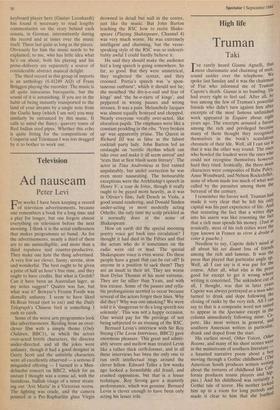Television
Ad nauseam
Peter Levi
Uor weeks I have been keeping a record
of television advertisements, because one remembers a book for a long time and a play for longer, but one forgets almost everything on television before the next morning. I think it is the serial endlessness that makes programmes so banal. As for the advertisements, nearly a third of them are to me unintelligible, and more than a third repulsive and counter-productive. They make one hate the thing advertised. A very few are clever, funny, serene, slow and wonderful. The best ought to be given a prize of half an hour's free time, and they ought to have credits. But what is Grolsh? Can it have been an Australian lager, as my notes suggest? Quatro was fun, but what was it? Bowyer's Frozen Foods was dismally unfunny. I seem to have liked Hi-Bran bread (not to eat) and the Daily Telegraph's Chinese bird is something I rush to catch.
Some of the worst arts programmes look like advertisements. Reeling from an over- clever film with a simple theme (Only Children, BBCI), in which the actors over-acted brittle characters, the director under-directed, and all the jokes were unfunny, though it had a good designer in Gerry Scott and the unbrittle characters were all excellently observed — a serious if misguided offering — I turned to a Men- delssohn concert on BBC2, which for an instant I thought was a comic ad, with the fastidious, bullish visage of a tenor strain- ing out 'Ave Maria' in a Victorian recess. The lighting was crude, and the camera pointed at a Pre-Raphaelite glass Virgin drowned in detail but null in the centre, just like the music. But John Barton teaching the RSC how to recite Shake- speare (Playing Shakespeare, Channel 4) was very much worse. He was extremely intelligent and charming, but the verse- speaking style of the RSC was so indescri- bably awful I could hardly believe it.
He said they should make the audience feel a long speech is going somewhere. So far, so good. But they were unmetrical, they neglected the syntax, and they crooned. Portia's speech was 'a spon- taneous outburst', which it should not be; she mouthed 'the dre-e-e-ead and fear of kings' and 'the he-e-earts of kings', and peppered in wrong pauses and wrong stresses. It was a pain. Melancholy Jacques was almost equally honeyed and chopped. Nearly everyone vocally over-acted, like elocution pupils. The emphases were like a constant prodding in the ribs. 'Very broken up' was apparently praise. The Queen in Richard /// was as false as the falsest cocktail party lady. John Barton led an onslaught on 'terrific rhythm which can take over and make it all seem unreal' and 'texts that at first blush seem literary'. The actor in Titus Andronicus at first ranted unpalatably, but under correction he was even more nauseating. The honourable exceptions were the Archbiship's speech in Henry V, a tour de force, though it really ought to be guyed more heavily, as it was in Olivier's film; Judi Dench as Viola, a good sound rendering, and Donald Sinden under-acting or most modestly acting Othello, the only time my scalp prickled as it normally does at the noise of Shakespeare.
How on earth did the special mooning poetry voice get back into circulation? I thought it had died in the Fifties and that the actors who do it sometimes on the radio were old or mad. The special Shakespeare voice is even worse. Do these people have a grant that can be cut off? Is anyone in a position to sack them? They are an insult to their art. They are worse than Dylan Thomas at his most extreme. They are far sillier than Yeats, and with less excuse. Some of the pauses and sylla- bic prolongations seemed to occur because several of the actors forgot their lines. Why did they? Why was one smoking? We were told it is 'dangerous to do a long speech too solemnly'. This was not a happy occasion. One would pay for the privilege of not being subjected to an evening of the RSC.
Bernard Levin's interview with Sir Roy Strong (The Levin Interviews, BBC2) gave enormous pleasure. This great and admir- ably severe and mellow man treated Levin like a rather thick sixth-former, and in all these interviews has been the only one to run swift intellectual rings around the clever fellow. Edward Teller a few weeks ago looked a formidable old fraud, and crushed opposition, but that is a lesser technique. Roy Strong gave a masterly performance, which was genuine. Bernard Levin is clever enough to have been only acting his lesser role.










































 Previous page
Previous page